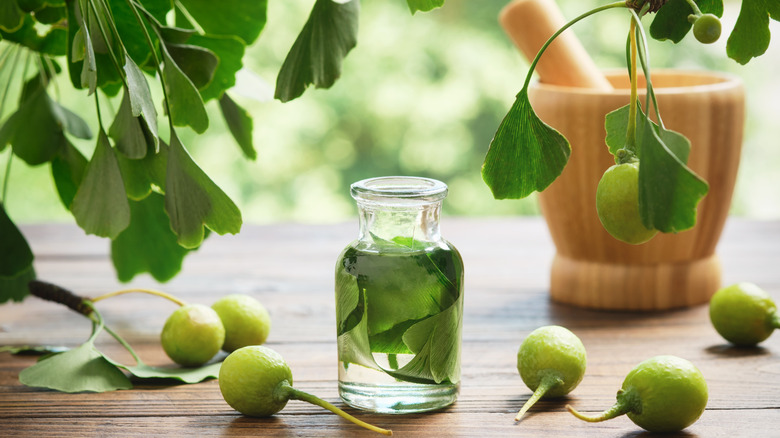The Leaf Of This Powerful Fruit Could Prevent Heart Disease And Alzheimer's At The Same Time
With heart disease continuing to be the number one killer of people worldwide, more and more studies emphasize the importance of eating more whole fruits and vegetables to reduce your risk of the disease. Eating more fruit drops your risk of heart disease by 9%, according to a 2020 review in the Journal of the American Heart Association.
Although fruit has many antioxidants to improve your heart health, some fruits find their healing power in the leaves. Both the leaves and fruits of the ginkgo biloba tree have been used in Chinese medicine for thousands of years, but its health benefits weren't recognized in the West until about 40 years ago. According to a 2022 review in Plants, the biflavonoids in ginkgo biloba may have the power to reduce your risk of heart disease by preventing clogged arteries, relaxing blood vessels, and improving circulation. Biflavonoids are pairs of linked flavonoids that work together.
Some of the same biflavonoids that protect your heart may also protect your brain. Specifically, amentoflavone, ginkgetin, and isoginkgetin have been found to guard the brain from oxidative stress and the build-up of amyloid beta protein associated with Alzheimer's disease.
Ginkgo biloba may protect the heart and brain
Your heart health is closely connected to your brain health, particularly as you age. A 2024 article in Stroke outlined how heart failure, coronary heart disease, and atrial fibrillation can lead to later cognitive impairment. Factors such as inflammation, reduced blood flow to the brain, and the buildup of fats in the walls of blood vessels can lead to neurodegeneration.
(Read about the 14 signs your brain is aging faster than you are.)
Ginkgo biloba leaf extract may help with some of that inflammation. A 2022 review in Phytotherapy Research pooled the results of 17 clinical trials on the extract. Ginkgo biloba not only lowers inflammation but also reduces C-reactive protein (CRP), interleukin-6 (IL-6), and tumor necrosis factor-α (TNF-α). These inflammatory markers are closely linked to conditions such as heart disease, type 2 diabetes, Alzheimer's disease, and arthritis.
A 2022 review in Cells found that ginkgo biloba extract improved memory in 17 animal studies and 20 human studies. However, many of these studies had small sample sizes and weak research protocols. The drug donepezil is often prescribed for people with dementia to improve memory and cognition. Ginkgo biloba may make donepezil more effective, according to a 2023 systematic review in Frontiers in Aging Neuroscience. Across 18 clinical trials, combining ginkgo biloba with donepezil improved cognitive function and daily living abilities better than donepezil alone.
Potential side effects of taking ginkgo biloba
Because ginkgo biloba is a supplement and not a drug, it's not regulated by the Food and Drug Administration for safety or potency. It also won't show up on your medication list when you go to the doctor. Although the National Center for Integrative and Complementary Health considers ginkgo biloba to be safe in moderation, you should still let your doctor know if you're taking the supplement, especially if you have dementia, high blood pressure, diabetes, or bleeding problems. Medications to treat blood clotting, high blood pressure, and pain may interact with ginkgo biloba. Taking trazodone and ginkgo biloba may increase side effects such as drowsiness or loss of muscle coordination, especially in older adults (per Drugs.com). Ginkgo biloba may have side effects such as headache, constipation, heart palpitations, or dizziness.
One thing to note is that although the ginkgo biloba produces an edible fruit, you can't just add it as a topping to your yogurt. The cherry-sized fruit can smell like vomit or Camembert cheese (per Gardening Know How). Some may eat the nut inside the fruit (which is actually a seed), but the nut can be toxic in large amounts. Getting to the seed can be tricky because its outer coating can cause itchy blistering on your skin.



